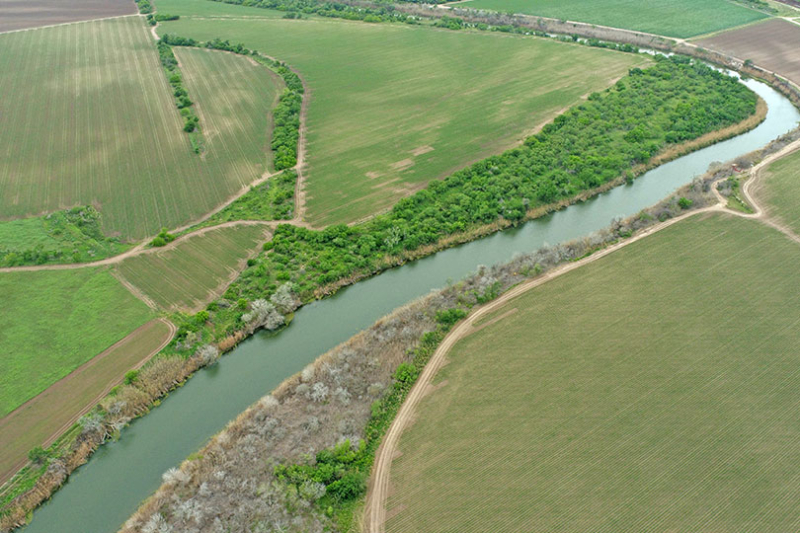By Jessica Domel
Multimedia Reporter
U.S. Congresswoman Monica De La Cruz of Texas is calling on House leadership to include $280 million in emergency assistance for South Texas farmers in an upcoming appropriations bill.
“South Texas farmers have suffered immensely due to the Mexican government not complying with the 1944 Water Treaty where they owe us so much water,” De La Cruz told the Texas Farm Bureau Radio Network. “It is so much water that we have lost the sugarcane industry. It is gone from South Texas, and very sadly, the citrus industry is next.”
The congresswoman has written a letter to House leadership and spoken to the appropriations committee asking them to act swiftly to provide the aid South Texas desperately needs.
“I’m advocating for the South Texas Agriculture Emergency Assistance Act to provide financial relief to these farmers along the Rio Grande in South Texas,” De La Cruz said.
The act, if passed or included in appropriations, would require the U.S. Secretary of Agriculture to allocate a $280 million grant to Texas to provide vital financial assistance to Texas farmers with operations in the Rio Grande Valley.
The grant would be administered through the Texas Department of Agriculture.
De La Cruz said leadership seemed receptive to including the bill in appropriations.
“They understand how important South Texas is and South Texas farmers and ranchers,” De La Cruz. “At the end of the day, our farmers feed and fuel America. Without the water they need, their crops, their livelihoods and most importantly, our food supply, is at risk.”
The congresswoman is also working with senators to have similar legislation on the Senate side.
“God willing, we will get some relief for our South Texas farmers and ranchers,” De La Cruz said.
According to De La Cruz’s office, Mexico’s failure to deliver water as outlined in the 1944 Water Treaty has already resulted in:
- $98.5 million in losses for sugarcane, the loss of the state’s last remaining sugar mill and 500 jobs.
- $147 million in citrus production losses and the removal of over 7,000 acres of orchards.
- $72.5 million in vegetable revenue losses for the 2024-2025 crop year.
- $25 million in losses for corn and sorghum due to reduced yields.
“It has been devastating not to receive water from the Mexican government, and I talk most about our sugarcane because that’s been lost,” De La Cruz said. “Many of our crops are at risk of being lost, as well. This is a very serious issue for our farmers in South Texas, and I’m fighting to ensure that leadership in Washington, D.C. is paying attention to the challenges our South Texas farmers and ranchers face.”
While Congress considers that legislation and emergency assistance for impacted farmers, Mexico has begun delivering some of the water it offered the U.S. to bring it closer to compliance with the terms of the 1994 Water Treaty.
In November, officials announced the U.S. and Mexico agreed to a Minute to treaty in which Mexico agreed to deliver water from the San Juan River to the Rio Grande for U.S. users.
The San Juan River is not typically part of the 1944 Water Treaty. Mexico offered water from the river as its dams are currently over-flowing thanks to a tropical storm.
Mexico agreed to deliver the water if the U.S. would count it toward its water debt to the U.S.
Mexico initially offered the U.S. 120,000 acre-feet of water the San Juan, but later increased the amount to 203,000 acre-feet, per myRGV.com.
The water will be made available as the U.S. requests it, according to the Minute.
De La Cruz said she is supportive of the efforts to secure water resources for the Valley, but she feels like it’s not enough.
“In fact, I know it’s not enough in talking to our farmers and ranchers,” De La Cruz said.
According to MyRGV.com, the Texas Commission on Environmental Quality will keep track of the water diversions from Mexico.
They will grant temporary permits to water rights holders that allows them to divert some of the water delivered to the Rio Grande by Mexico.
The news outlet reports the International Boundary and Water Commission has agreed to give Mexico credit for 95 percent of the water delivered to the Rio to reduce its water debt to the U.S.
As of November, Mexico owed the U.S. more than 1.5-million acre-feet of water. It’s due by October 2025.
De La Cruz said she will continue to fight for South Texas farmers.
“I’ve also secured language in our appropriations bills that would withhold 100% of any money that the United States gives to the Mexican government when they do not fulfill their obligation under the 1944 Water Treaty,” De La Cruz said. “We are taking this issue as far as we can because that Minute is not satisfactory to what South Texas farmers really need.”
Under the 1944 Water Treaty, the U.S. sends 1.5-million acre-feet of water from the Colorado River to Mexico on a five year cycle.
Mexico is supposed to send 1.75-million acre-feet of water to the U.S. via the Rio Grande on a five-year cycle.


Leave A Comment